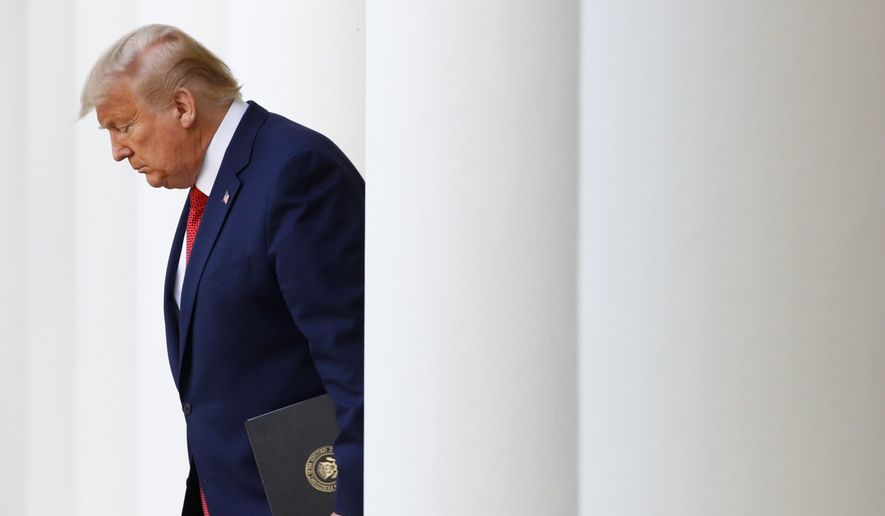Top U.S. and Chinese governing officials insist the commitments of a major trade deal are still moving forward despite the pandemic spread of COVID-19, but experts caution the full impact of the crisis has yet to be felt.
The fate of President Trump’s landmark “Phase One” trade deal with Beijing, a centerpiece of his agenda to reorient U.S. trade policy, still hangs in the balance amid signs from China that the domestic economy is clanking back to life after being staggered by the first onslaught of the coronarvirus.
As Washington and Beijing have traded angry accusations over their handling of the virus pandemic, U.S. corn and grain producers say sales to China have been solid, and the U.S. Department of Agriculture last week hailed a number of market-opening steps by Beijing on beef, pork and other products even in the teeth of the global health crisis.
U.S. Trade Representative Robert Lighthizer in a statement last week said his office was “working with China on a daily basis” to implement the Phase One deal.
For President Trump, the progress could mark a rare economic bright spot amid plunging world stock markets, mass layoffs, oil price wars and other disruptions caused by the coronavirus crisis.
“I was told by [Agriculture Secretary] Sonny Perdue that China has been buying a lot of our farm product,” Mr. Trump made a point of noting during a White House briefing late last week on the COVID-19 crisis. It was “a very big trade deal, and China has been buying our agricultural product.”
During a recent conference call, John Newton, chief economist at the American Farm Bureau, said China has taken “meaningful steps” to address non-tariff barriers to trade. “We now understand that almost 500 [U.S.] beef plants have been approved for export to China,” Mr. Newton said. “They’re streamlining and enhancing many of the approval processes needed to get more U.S. agricultural products to the country.”
In Beijing, the head of the China Petroleum and Chemical Industry Federation told state media that China could buy nearly $33 billion worth of American energy products this year, including crude oil and liquefied natural gas, citing both global market conditions and the new atmosphere under the trade deal.
The pervasive spread of the coronavirus took its toll on the Chinese economy as millions were forced to stay home, yet a recent decrease in China’s virus caseload is making for economic reboot, experts say.
Officials in Wuhan on Monday said the market believed to be the first source of the virus has finally reopened, although few customers were venturing out.
But analysts say the Phase One deal has yet to be fully tested, and the data to date show very little movement the despite positive rhetoric.
With both China and the U.S. staggered economically by the virus, the commitments are in serious doubt, according to Peterson Institute International Economics Fellow Mary Lovely.
“There’s a real question as to the economic capacity in both countries [right now],” Ms. Lovely said, adding that “it’s hopeful that the officials are saying that they still intend to meet these obligations.”
China under the January deal committed to importing an additional $200 billion in American goods over the next two years. On the flip side, President Trump agreed to a slight reduction in bilateral tariffs, but kept the tax in place for $375 billion worth duties on Chinese imports.
Experts say the trade deal could proceed alongside rising political tensions between Washington and Beijing, so long as officials put their difference aside for the sake of mutual economic gain.
“There are questions about [Phase One] implementation, but I think those are probably separate from the media tit-for-tat dispute,” Jacob Stokes, senior policy expert at the U.S. Institute of Peace said.
“There was a recognition that you had a lot of disagreements outside of the trade portfolio,” he added, ” but you were going to deal with trade as its own issue aside from other issues in US-China relations.”
The Trump administration announced plans Friday to solicit public comments on lifting additional tariffs on Chinese imports in wake of the coronavirus pandemic, a day after Mr. Trump and Mr. Xi held a fence-mending call.
Both sides may be a little more understanding given the trauma facing the world.
“I think from the Trump administration’s perspective, unless our trade deficit with China really spikes in the next little bit, they’re not about to squawk too hard about China taking a little bit of time on the purchases,” Charles Freeman, senior vice president for Asia at the U.S. Chamber of Commerce, told Fox Business News last week.




Please read our comment policy before commenting.